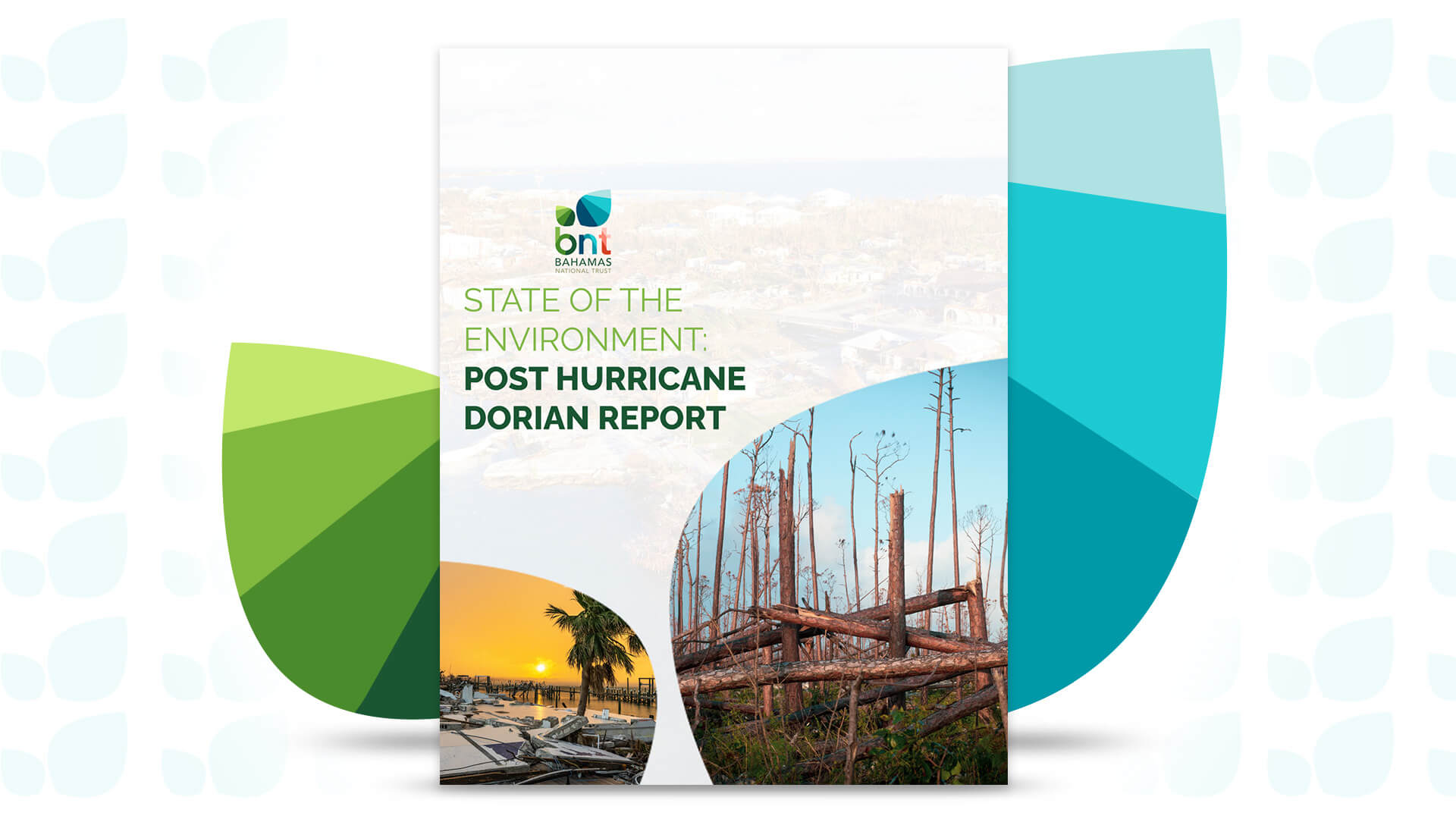BNT Releases “State of the Environment: Post-Dorian Report” & Petroleum Disaster Policy Recommendations to Government
 New BNT report highlights alarming environmental findings post-Dorian, and recommends “polluter pays” policies along with restoration investments to aid ecosystem recovery.
New BNT report highlights alarming environmental findings post-Dorian, and recommends “polluter pays” policies along with restoration investments to aid ecosystem recovery.
December 9th, 2021 – Nassau, Bahamas
Today, The Bahamas National Trust (BNT) released their 2021 “State of the Environment: Post-Dorian Report,” which includes policy recommendations like a “polluter pays” model for government management of oil spills and other crises. The report chronicles in-depth assessments of Abaco and Grand Bahama’s environmental state after being severely impacted by the catastrophic Category 5 Hurricane Dorian. It presents the results of scientific research by several contributors who collaborated to conduct assessments of the environment after the storm, and also offers recommendations for the road to environmental recovery. The report was submitted to the Government of The Bahamas and released to the public several months after the second anniversary of Hurricane Dorian.
Detailed in the report are the impacts of the Equinor oil spill on the environment, as well as Hurricane Dorian’s direct impact on forests, coral reefs, mangroves, seagrass communities, birds, and marine mammals. Key findings outlined in the report include:
- Concentrations of oil found in the Equinor oil spill site remain high enough to negatively impact birds and other exposed organisms
- Coral reefs closest to shore experienced damage from debris, especially invasive Casuarina trees that were uprooted by the storm and driven into reefs by tides and storm surge
- More than 73% (22,528 acres) of Grand Bahama’s mangrove cover and 40% (21,678 acres) of Abaco’s mangrove cover were damaged during the storm
- The destruction of 24% of pine forests on Abaco and 77% of pine forests on Grand Bahama
- The disappearance of The Bahama Warbler on Grand Bahama after the storm, leading to it being listed as an endangered species
- Changes in seagrass bed composition following Hurricane Dorian
Given the severe impacts detailed in the report and the anticipation of more major climate events to come, the BNT summarizes policy recommendations for environmental recovery and restoration into four main points:
- The petroleum-related policies of The Bahamas should include taxation or other revenue streams related to the petrochemical industry (including fuel transport, etc.) to provide for national risk management investments and regulations to ensure adequate prevention, preparedness and response capability to disasters; and these policies/fees should reflect the value of the ecosystems and communities that rely on them. (This is often referred to as a “polluter pays” model.)
- Restoration and monitoring will be pivotal in protecting coral reefs from threats including hurricanes, coral bleaching, Stony Coral Tissue Loss Disease (SCTLD), and pollution such as oil spills.
- The pine forests and mangroves of Abaco and Grand Bahama require rehabilitation, restoration and monitoring efforts to return to a functional state and provide critical services as habitats, protective structures, and community and tourism resources.
- A national-level conservation plan for threatened species and habitat types, that includes spatial plans with priority restoration zones and priority activities within the hurricane-impacted areas on Abaco and Grand Bahama, is needed to guide recovery.
Despite the alarming discoveries, there were also some positive findings. Namely, preliminary data suggests Dorian may not have had direct catastrophic impacts on bottlenose dolphin populations in the Sea of Abaco. However, long-term monitoring is needed to track indirect impacts on marine mammals. Additionally, more recent surveys of mangroves on both Abaco and Grand Bahama in 2021 indicate that there are mangrove areas experiencing natural recovery. Bonefish and Tarpon Trust, the BNT and the Perry Institute for Marine Science have already begun restoration efforts for the hardest hit mangrove areas.
Falon Cartwright, BNT Director of Science and Policy, notes that “these studies provide a critical baseline to assess the long-term impact of Hurricane Dorian and the success of recovery and restoration activities. It is imperative that everyone involved uses sound scientific data to inform the overall environmental recovery strategy and prioritize intervention and allocation of resources accordingly. This effort will span years and we have to be in it for the long haul.”
The 2021 “State of the Environment: Post-Dorian Report” amalgamates research by The Bahamas National Trust, the American Bird Conservancy, the Perry Institute for Marine Science, the University of Alabama, The Bahamas Ministry of Forestry, Bonefish & Tarpon Trust, Science and Perspective, Waterkeepers Bahamas, Bahamas Marine Mammal Research Organization, Louisiana Universities Marine Consortium, and Florida International University.
The report confirms the preliminary findings outlined in a documentary produced by the BNT in 2020. To watch the “Searching For Survival” documentary, visit https://bnt.bs/hurricane-dorian/.
To read or download the full report, visit: bnt.bs/postdorianreport
To learn more about the role the BNT plays to manage terrestrial and marine national parks, protect species that inhabit them, and inform environmental policy, please visit its website: www.bnt.bs and follow/subscribe to various social media channels: Facebook, Instagram, Twitter, and YouTube.
###
Media Contact: Leah Carr | lcarr@bnt.bs | (242) 429-7902
About the BNT:
The Bahamas National Trust (BNT) was created by an Act of Parliament in 1959 to build and manage the national park system of The Bahamas. Possibly the only non-governmental organization in the world charged with such a responsibility, the BNT works daily to conserve and protect the natural resources of The Bahamas through stewardship and education for present and future generations. There are currently 32 National Parks managed by the BNT with more than 2 million acres of marine and terrestrial areas protected.